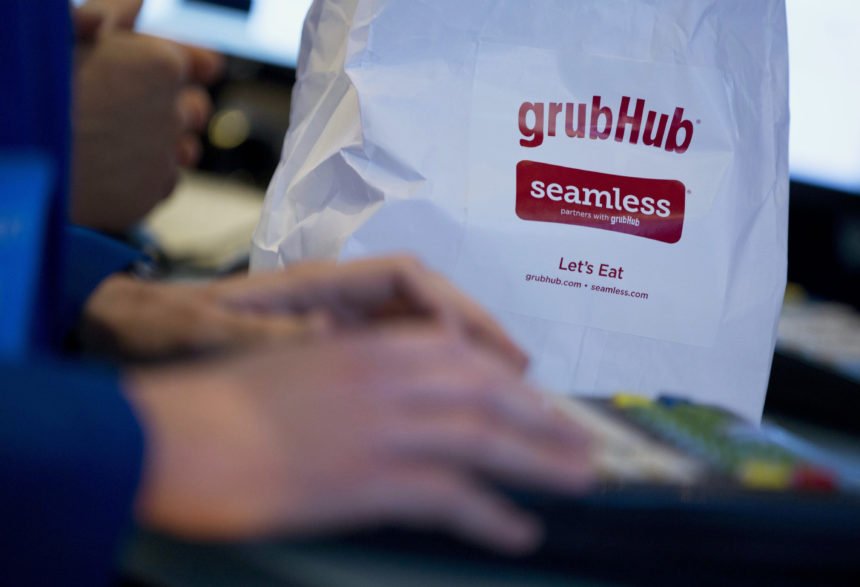Are food deliveries and groceries safe during coronavirus pandemic? Yes, experts say

President Donald Trump and governors of various states have suggested Americans should avoid restaurants due to the coronavirus pandemic.
Instead we’ve been told to either order delivery, takeout or carefully shop at the grocery store, which has left many people wondering: How safe is it to do all of those things as the virus spreads?
It’s not the food itself
First, the good news: The virus is not likely to be transmitted by food itself, said Dr. Ian Williams, chief of the Outbreak Response and Prevention Branch of the US Centers for Disease Control and Prevention, which investigates foodborne and waterborne illnesses.
“There is no evidence out there that, so far with [Covid-19], that its foodborne-driven or food service-driven,” Williams said in an information webinar. “This really is respiratory, person-to-person. At this point there is no evidence really pointing us towards food [or] food service as ways that are driving the epidemic.”
The US Food and Drug Administration echoed that sentiment, saying on its website that it’s not aware of any reports suggesting Covid-19 can be transmitted by food or food packaging.
At least that’s what we know right now, and experts have said they will continue to evaluate the virus.
However, the FDA did issue a reminder about everyone in the food supply chain following proper hygiene practices, including washing hands and surfaces regularly to keep the risk level low.
If you’re picking up takeout or getting delivery
More reassuring news: There’s little risk in contracting the virus from food or food packaging picked up at a takeout window or from a restaurant, said Benjamin Chapman, who is a professor and food safety specialist at North Carolina State University.
“I want to be clear that food or the packages could carry the virus, but the risk of transmission is very, very low,” Chapman said. “This is a remote possibility and thousands if not millions of times less likely than any of the other exposure routes. Really, really low risk.”
Any real risk of contamination, he said, would come from the worker handing out the food.
“There’s a chance that the food employee in the window is sick, but likely the food business is following employee health policies and local health department recommendations to keep these individuals home,” Chapman said.
“A lot of the delivery services are working on best practices,” said Don Schaffner, an extension specialist in food science specializing in microbial risks, handwashing and cross-contamination.
Those include contactless deliveries, such as customers asking for food to be left on a porch or at a doorstep, and using touch-free and cashless transactions.
Even more comforting news: Even if you did eat food with the virus, there are not many receptors in the digestive track for the virus to cling to, so swallowing the virus would not likely lead to contracting the illness.
In other words, your digestive system would get rid of it, Williams said.
Despite the small risk, there are steps to take for those who are concerned, especially the elderly, who need to be more careful. Experts recommend they pick up any takeout or delivery packages with gloves.
“You can remove your food from the external packaging, properly dispose or recycle it,” and put the food on a plate, Schaffner advises. Then after disposing of the gloves, “wash and or sanitize your hands before sitting down to eat.”
If you’re going to the supermarket
Here’s the tougher news: Crowds full of people that can cough or sneeze or spread their germs on grocery carts and checkout lines. That’s part of why social distancing has been encouraged and part of the reason grocery stores can be a problem. Many people are feeling stressed and anxious about food, despite being told food supplies are fine and super markets will be restocked. For those worried about the crowds, going during off hours can help.
“People in the store [are] the top risk on my list,” Chapman said, when it comes to grocery stores.
Anyone who is sick or thinks they might be sick should avoid going to stores, experts say.
“Think of the other people that would be affected,” Schaffner said. “If you are sick, please strongly consider using a delivery service.”
There are things you can do at the store on your own, if you have the supplies. So you don’t need to even touch a cart or basket, bring gloves or wipes or hand sanitizer with you, along with those planet-friendly reusable grocery bags.
When it comes to food and food packaging inside a grocery store, again, the risks are low, experts said.
“While it’s possible that the virus gets deposited [on packaging] we have no indication from epidemiology or the literature that this is a risk factor for Covid-19 or other respiratory illnesses,” Chapman said. “Even with the millions of cases of influenza each year, packaging isn’t something we talk about.”
Even in a worse case scenario, the coronavirus is only likely to be an issue if an infected person coughed or sneezed directly on the food or packaging, rather than if they just touched it, both food scientists said.
In order to catch the virus that way, though, you’d have to touch the contaminated item, then touch your face, they said.
All the health agencies and experts have stressed keeping hands away from the face as a primary means of avoiding the virus.
Which is why, Schaffner said, when you leave the store, you should make sure to sanitize your hands.
“If you are worried, you can always wash and or sanitize your hands after handling anything that you think might be contaminated” Schaffner said.
The bottom line, experts ssaid, is that there is an extremely low risk of contracting coronavirus from the food supply.
“As a good friend used to say, the risks of not eating still outweigh the risks of eating,” Schaffner said.
